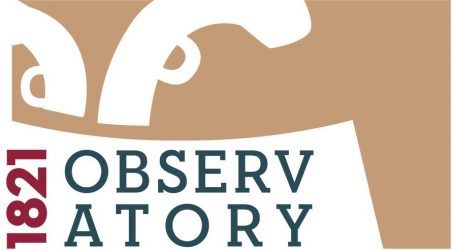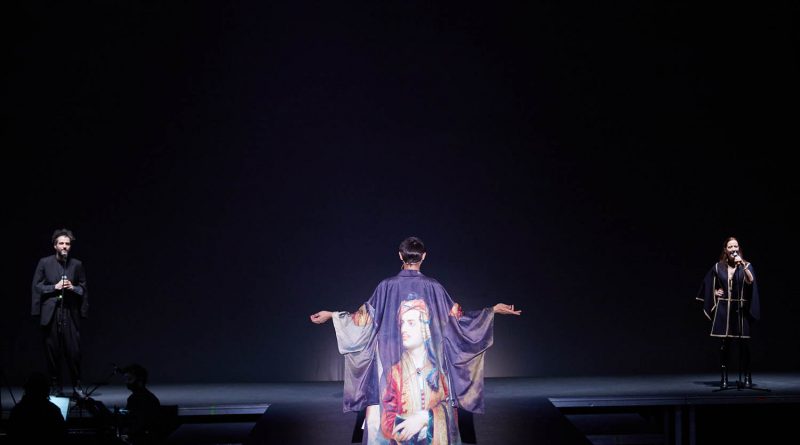1821 OBSERVATORY: THEATER
The enforcement of restrictive measures due to the Covid-19 pandemic during the bicentennial year of 2021 resulted in the scaling down of theatrical activity and the cancellation or postponement of many performances, including those related to the bicentenary of the 1821 Revolution. Some of the scheduled performances were live streamed, creating unprecedented conditions for theatrical activity, while many others were postponed to the 2021/2022 season.
After the general absence of the theme of the Greek Revolutionfrom the Greek scene in recent decades (since 1980,the relevant performances could be counted on one hand), there was an exuberance of performances on the occasion of the bicentenary during the 2020/2021 and 2021/2022seasons.
Most of these theatrical performances were usually productions of major institutions (such as the Greek National Opera and Athens Festival), while the relatively few private productions were festival entries or subsidised by an event programme (such as the Culture Ministry’s “All Greece a Civilization”). There were also a few private organisations that planned a series of events, such as the Art Theatre, with its three-year programme“200 years since the Revolution: What is Modern Greece?” which started in March 2018.
Of the three state stages, only the Greek National Opera dedicated its entire programme in 2021 to performances related to the bicentenary, while the Alternative Stage proceeded with a series of musical theatre performances, which approached the relevant topics in an experimental form. In fact, the Alternative Stage programme was the only one that included “the other side”, with the assignment of the work Jus soli to the Turkish-American composer Kamran Ince, but its presentation was postponed.
Both the National Theatre and the State Theatre of Northern Greece paid little attention to the bicentenary. The former presented only four performances, three of which were live streamed (Solomou’s Free Besieged;M. Karagatsis’Kodjabashis of Kastropyrgos, and Vyzantios’s Babylonia), without seeming to be part of a single design. The absence of the theme of 1821 was even more glaring in the latter, which presented only Babylonia (October 2020 and 2021) and Efthymiadis’The Protectors (February 2022).
Turning to the summer festivals, some adopted themes related to the bicentenary (such as the Philippi Festival with Dionysios Solomos) as a guiding thread in the design of their events, and others simply used a relevant title, including related events in their schedule. Finally, the Athens Festival included in its events a very small “Circle for 1821”, with only two new theatrical productions (National Fashion Show, directed by Pantelis Flatsousis and The Republic of Baklava, directed by Anestis Azas), which, however, were important contributions in the reflection around national identity.
Finally, some municipal regional theatres (such as Kalamata) chose to present performances or events with relevant themes, without leaving any particular imprint.
The performances presented were characterised by morphological pluralism: from opera and musical theatre to skit (The 1821: The Skit, directed by Dimitris Karantzas) or stand-up comedy (1821-2021: Two Hundred Years on Loan, with Christoforos Zaralikos).
The texts used for these performances are of various origins: they included texts written about it (e.g. A Country Two Centuries Later, by Andreas Flourakis), which were composed for the performance and enriched during rehearsals (e.g. National Fashion Show), literary texts adapted for the theatre (e.g. Loukis Laras by Dimitrios Vikelas) or, finally, older texts that the artists approached with a new look (e.g. Achilles: Begging Greece, by Athanasios Christopoulos, from the theatrical group Bijoux de Kant).
The most notable absence from all programmes was 19th- and early 20th-centuryhistorical drama whose protagonists are heroes of the Revolution, proving that it is a theatrically barren literary genre.
After all, the artists for whom the bicentenary was a creative stimulus saw it as an opportunity to discuss, through their work, the national narrative, to talk about the course of the Greek state during these two centuries and to discuss the concept of national identity, especially as who it may include.
Pericles Chrysafacoglou, PhD candidate at the Department of History and Ethnology, Democritus University of Thrace

